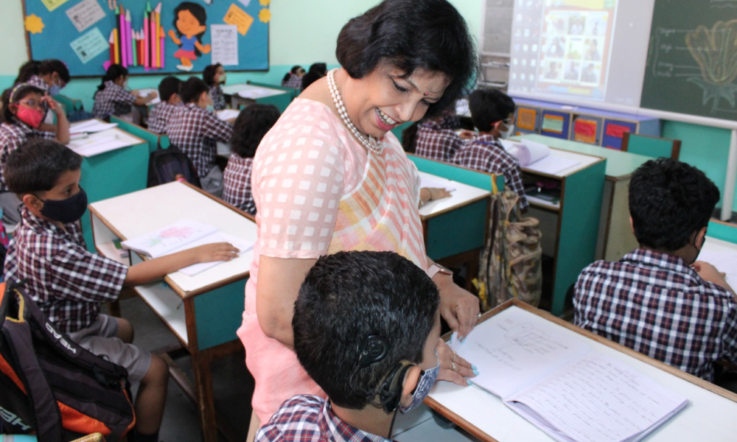Our ‘Leading voices’ article series features school principals from across India. Dr Sarojini Rao is principal of the Indus International School (IIS), Bangalore, a leading international day-cum boarding school in India. Here, Anannya Chakraborty asks her 5 questions, including what initiatives the school has taken to implement the recommendations of the National Education Policy 2020, and how she tackles tough questions from parents.
What new initiatives have you undertaken at your school based on the recommendations of the National Education Policy 2020?
At Indus International School, we introduced a life entrepreneurship program called Startup You in 2020, that prepares high school students to become lifelong learners and be future-ready in an uncertain world. In this online student startup course, they thrive to learn, unlearn, and relearn, as well as to upskill, reskill, rediscover, and reinvent continuously.
To be able to learn, unlearn and relearn is an important skill for self-development. With the evolving landscape of education where technology can deliver content in a much better manner, the teacher’s role changes from the transaction of knowledge to the transformation of the child to be future ready and prepare them for a life that is getting increasingly uncertain and ambiguous.
What teaching and learning initiatives are you most proud of in your own school?
We are proud of the school’s innovative collaborative learning model, which harnesses the combined strengths of human and artificial intelligence.
In today’s rapidly evolving digital landscape, it is well known that technology can teach content faster and in a much better manner than traditional teachers. The aspects which technology cannot teach are matters of the heart and the mind. As a result, teachers have to ‘re-role’, but they now play a more significant role than they did previously.
In the school’s collaborative learning model, students are encouraged to think critically and become self-directed learners who focus on the application of knowledge to create and innovate. The model also prioritises personalised learning, empowering students to take ownership of their education, learn, unlearn, and relearn, which in turn leads to student agency. As a result, teachers can now focus on nurturing the whole child and not just teaching the subject alone.
What do you do to address exam- and performance-related stress among students?
To alleviate exam- and performance-related stress, our approach centres on inculcating a positive mindset and a spirit of continuous improvement.
Students are encouraged to share their feedback with teachers at the end of every lesson, which helps the teachers to course-correct and ensure effective learning. We prioritise open communication with students and parents, maintaining regular feedback loops.
Students are also given self-directed learning modules which increase engagement and retention.
Continuous assessments serve as regular checkpoints that help alleviate last-minute stress. They also support students to thrive academically and emotionally.
Our curriculum includes sessions on essential life skills such as time management, self-management, note taking, and organisational skills, to name a few.
At Indus, students know that ‘focus’ is the ‘new IQ’ and to enhance that we have introduced mindful breathing techniques which help to reduce stress. We encourage our students to compete with themselves and celebrate both success and failures as opportunities for growth.
How do you tackle tough questions from parents?
More often than not, problems arise when teachers pass on unclear and confused messages to parents. At our institution, we place great importance on addressing challenging questions and concerns from parents through a multifaceted approach.
As a policy, we acknowledge feedback that comes from parents within 48 hours and understand that it is given with the intention of doing what is best for the child.
We established a Parent Advisory Committee (PAC) to provide a direct platform for parental input and collaboration. Actively seeking feedback is a cornerstone of our engagement strategy; with open channels of communication (such as open forums, PAC meetings and parent access to classrooms, in addition to regular channels like emails and WhatsApp) ensuring parents can express concerns and offer suggestions.
Moreover, we empower parents and students to be agents in education, and they are encouraged to actively participate in setting goals and making decisions about their learning journey. This collaborative approach strengthens our school-parent partnership, ensuring that parental questions and concerns are effectively addressed, and together we provide the best possible educational experience for all children.
We know that school principalship is a complex and demanding role that can cause stress and burnout. What strategies do you use to look after your own health and wellbeing?
As a school principal, I recognise the demanding nature of my role. To safeguard my wellbeing, I follow a balanced approach. This includes dedicating time to reading for both professional development and personal enjoyment, nurturing family connections and finding solace in the companionship of my pets. I maintain an active lifestyle through regular exercise, practice mindfulness and meditation.
I also believe that stress arises when one is not clear about one’s few vital priorities. I apply Pareto’s principle [also known as the 80/20 rule, or the law of the vital few, is the belief that for most outcomes roughly 80% of consequences come from 20% of causes] to clearly identify those priorities for the entire school year, term, month, and week.
I strongly believe in the power of a team; I also have a good team with whom I collaborate. When there is collaboration and we work together towards achieving a shared vision, the possibility for stress reduces.
As a school leader, what do you do to communicate effectively with parents? How does that help you meet parents’ expectations? How does it help to improve student learning outcomes?



